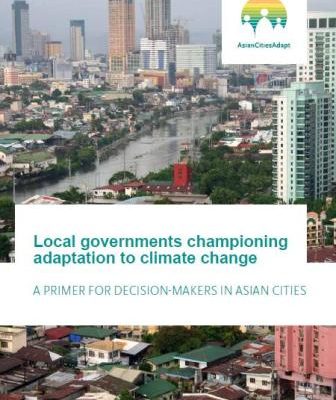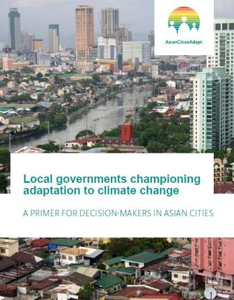An adaptation primer dedicated to local governments in Asia

Local governments in Asia and elsewhere have to acknowledge that climate change is happening and adds another layer of complex challenges to their local sustainable development agenda. Clearly, the impacts of climate change – in combination with population growth, rapid urbanisation, increasing informal settlements and high economic inequality – are stretching the limits of urban infrastructure and systems, and jeopardise the provision of basic services to all citizens, especially to the urban poor. At times, these impacts might become disasters with even more severe consequences leading to the loss of lives, the impairment of public health, and the destruction of personal property, infrastructure, and economic assets, all of which threatens a city’s ability to be a source of livelihood for its residents.
It has become imperative for local governments to act. Politicians and practitioners in local governments need to make it a priority to improve their understanding of potential climate change risks and local vulnerabilities, find out about ways and means to reduce adverse climate change impacts, and recognise them in their city planning processes. The ‘Local governments championing adaptation to climate change – A primer for decision-makers in Asian cities’ deals with the challenge of governance and management in cities in times of climate change, thus addressing a key actor in climate adaptation – local governments. This primer has been produced to share the path to adaptation that was promoted in the AsianCitiesAdapt (ACA) project with other local governments in the Asian region and encourage them to follow suit. The primer has two main objectives:
- Make basic information on climate change and its impacts in an urban context widely available.
- Provide an overview on the most important steps for developing and implementing a climate change adaptation plan at city level.
The primer targets officials of local governments in the Asian region whose leadership in climate change adaptation is regarded as indispensable if their cities are to become more resilient. It will also be useful for supporting government agencies and other stakeholders and institutions with an interest in local adaptation to climate change, such as researchers, business people, members of civil society organizations, and representatives of communities. The document gives a vivid description of the climate change scenario, with everything ranging from the background of climate change, identifying entry points for engaging in climate change adaptation, urban analysis, impact and vulnerability assessment, development of an adaptation plan to implementation, financing and monitoring.
This publication has been produced in the context of ‘AsianCitiesAdapt – Impacts of Climate Change in Target Cities in India and the Philippines and Local Adaptation Strategies’ (2010-2013). The project brought together science and policy in order to support local governments in their adaptation efforts. Howrah, Madurai, Kochi and Visakhapatnam in India; and Baguio, Dagupan, San Fernando (La Union), and Tuguegarao in the Philippines, were a part of the project.
To know more about the South Asian activities of the ACA project, visit:
http://southasia.iclei.org/our-goals/resilient-city/asiancitiesadapt/activities/
